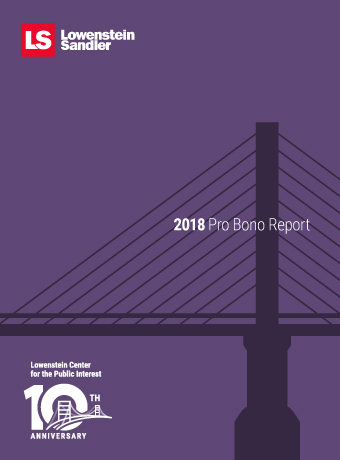Lowenstein Sandler announced today the release of its 2018 Pro Bono Report, which details the firm’s pro bono and community service efforts last year and marks the 10th anniversary of the firm’s Lowenstein Center for the Public Interest. In 2018, Lowenstein dedicated more than 19,000 hours of pro bono work spread among 600 clients. Much of that time was focused on the Center’s core practice areas, including immigration, civil and human rights, and criminal justice.
“Since the Center’s founding in 2009, Lowenstein has made significant and purposeful investments in our communities through our pro bono time and financial support,” said Gary M. Wingens, Chair and Managing Partner of the firm. “Over the past 10 years, we have dedicated more than 216,000 pro bono hours to serving over 2,200 clients. I am proud to be a part of a firm that advances social justice and promotes civic engagement to help people and communities in need.”
“Over the past 10 years, we have represented clients ranging from immigrant children to tenants facing eviction to survivors of domestic violence,” said Catherine Weiss, partner and Chair of the Lowenstein Center for the Public Interest. “Our work is more important than ever. We engineer and maintain vital community connections to create meaningful opportunities to serve the people and causes that move us. I’m proud of the network of volunteers, legal service organizations, and corporate partners that we’ve built to address the injustices marginalized groups face every day.”
Immigration
In spring 2018, immigrant children who had been separated from their parents began to flood New York shelters. The firm received a request from the Vera Institute of Justice in April 2018 to ensure that children in federal custody who were under the age of six were properly and ethically represented.
By the summer, the scope of the family separation crisis became clear: Papers filed in a class action in California reported that more than 2,800 children had been separated from their parents and remained in federal custody. In response, Gary M. Wingens, Lowenstein’s Chair and Managing Partner, and Brad S. Karp, Chairman, Paul, Weiss, Rifkind, Wharton & Garrison LLP, drafted a New York Times Op-Ed explaining the ongoing assault on the rule of law and secured commitments from 34 law firms to help reunify families and ensure representation for them. As the reunification process began under a court order issued in the California class action, Catholic Charities Community Services of the Archdiocese of New York reached out to the firm for assistance in advocating with class counsel and the Department of Justice on behalf of its child clients. The firm has represented Catholic Charities and other direct legal service providers for children ever since, negotiating solutions to problems facing groups of children who had been overlooked.
Lowenstein also worked closely with Kids in Need of Defense (KIND) to identify and collect contact information from an array of sources for approximately dozens of reunified families who appeared to have resettled in New Jersey, and the firm represents three of these families in their ongoing immigration cases.
In addition, the firm has worked to protect a group of Indonesian Christians from being deported to a country where they would face religious persecution, and we participated on behalf of amici in a case aimed at preserving Deferred Action for Childhood Arrivals (DACA).
Civil and Human Rights
Lowenstein teamed up with the National Women’s Law Center (NWLC) to ensure that the Affordable Care Act continued to cover contraception as preventative care. In 2018, the firm filed briefs on behalf of the NWLC, the National Latina Institute for Reproductive Health, SisterLove Inc., the National Asian Pacific American Women’s Forum, and 55 additional organizations in the Ninth and First Circuits that focused on the physical and economic harm that would result if the government allowed employers, colleges, and universities to opt out of providing contraceptive coverage at will and failed to make alternative coverage available.
The firm also represented numerous organizations dedicated to serving populations– such as foster children and people with disabilities–who often end up in government custody. On their behalf, we filed an amicus brief defending the use of class actions by groups who face common harms as a result of unconstitutional government policies. The amici and the parties won a significant victory when the U.S. Court of Appeals for the Eighth Circuit upheld the certification of a class of inmates who were being denied access to the most effective drug for treating their chronic hepatitis C.
Criminal Justice
In an expansion of 2017 pro bono efforts, the firm in 2018 partnered with the ACLU-NJ to investigate the use of prolonged involuntary protective custody (IPC) (a form of solitary confinement) in the New Jersey prisons. In the midst of the investigation, the Department of Corrections moved more than half of the inmates who had been in IPC into the general population. This important development now appears to have been part of the department’s welcome reconsideration of placement decisions aimed at reducing the use of prolonged isolation.
The firm continued its commitment to improving the juvenile justice system through direct representation of incarcerated youth, participation as amicus in significant appeals, and advocacy for ongoing reform. Working closely with the ACLU-NJ and Rutgers Criminal and Youth Justice Clinic, Lowenstein developed several proposed amendments to the Juvenile Code.
Access a digital version of the 2018 Pro Bono Report at this link. A PDF version is available here.











